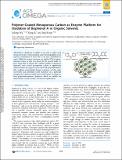Polymer-Coated Mesoporous Carbon as Enzyme Platform for Oxidation of Bisphenol A in Organic Solvents
Author(s)
Wu, Lidong; Ji, Xiang; Kong, Jing
DownloadPublished version (8.293Mb)
Publisher Policy
Publisher Policy
Article is made available in accordance with the publisher's policy and may be subject to US copyright law. Please refer to the publisher's site for terms of use.
Terms of use
Metadata
Show full item recordAbstract
© 2019 American Chemical Society. Bisphenol A (BPA) is not only a widely used chemical but also a toxic pollutant, and its biodegradation in an aqueous environment is hard due to its near insolubility in water. While the enzyme tyrosinase can oxidize BPA in organic solvents, it does so only very slowly. In the present study, we have found that in toluene the catalytic activity of tyrosinase deposited onto coated mesoporous carbon is significantly enhanced when the support is precoated with polyethylenimine. The resultant enzymatically formed o-quinone is both easily recoverable and potentially useful monomer. As a particular example, the o-quinone readily reacts with diamine in toluene to form poly(amino-quinone) polymers, which are suitable for anticorrosion, energy storage, or biosensor applications.
Date issued
2019Department
Massachusetts Institute of Technology. Department of Chemistry; Massachusetts Institute of Technology. Research Laboratory of ElectronicsJournal
ACS Omega
Publisher
American Chemical Society (ACS)